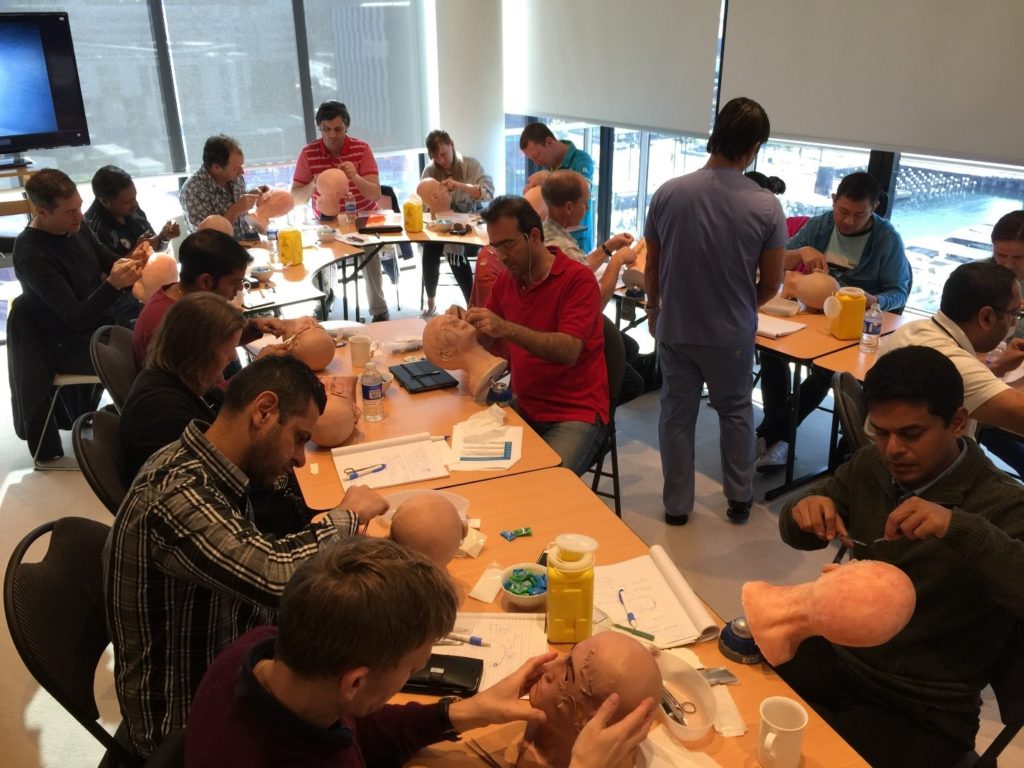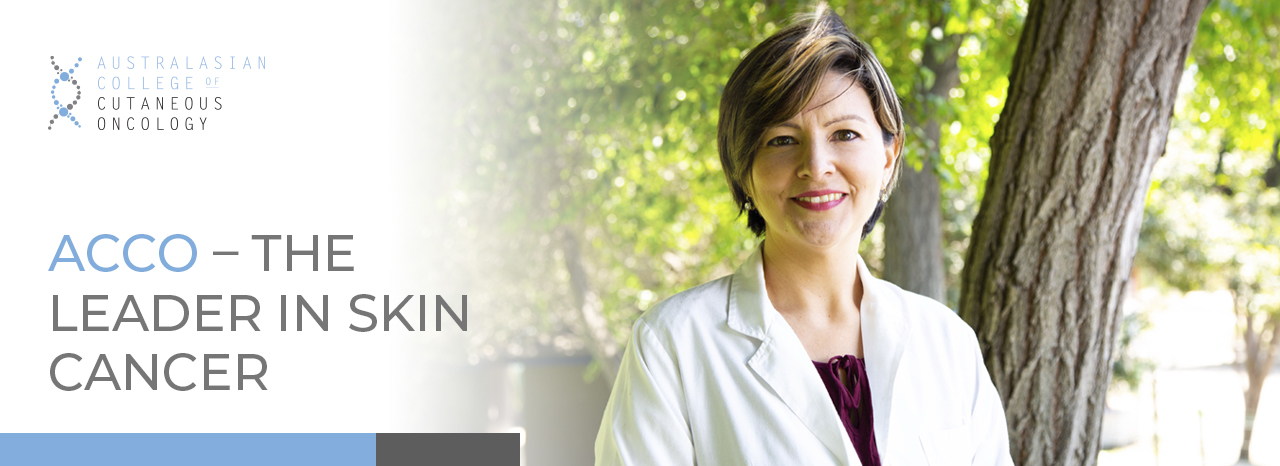Australasian College of Cutaneous Oncology (ACCO) is the first choice for GPs in Australia and New Zealand seeking to update or expand their skills through our practical and theory-based skin cancer workshops in managing the disease.
ACCO is vastly different to every other education provider for skin cancer courses. What is the difference?
Voluntary
All the ACCO medical experts donate their time for all teaching and research contributions etc. This includes Prof. Anthony Dixon, A/Prof. Howard Steinman, Dr. Alexander Nirenberg, Dr. Stuart Anderson, Prof. John Dixon, and Dr. James Campbell. We have some paid part-time administration staff. No other payments occur to any other personnel.
No drug company money allowed
ACCO does not accept sponsorship from any entity. Moreover, ACCO will not accept benefits or payments of any kind from the pharmaceutical industry. The ACCO academic team does not see pharmaceutical representatives. Certainly, we would not accept a so-called “free lunch” from a drug company. ACCO has completed several drug trials. Also, these were undertaken without drug company support. Likewise, we even sourced products for drug trials at a local pharmacy to ensure there was no drug company engagement.
No government support allowed
ACCO’s insistence of true independence is such that we also will not accept Government funding. In addition, no grants have or will be applied for. As a result, none would be accepted. Why? Even Governments have a vested interest in the outcome of research. For example, it would be in Government interests to find that observation of a lesion was more effective than excision of a specific skin lesion. The only way to ensure complete independence is to be completely independent. Moreover, ACCO research has often found that less intervention is perhaps the best.
No university funding allowed
For the same reasons ACCO does not apply for and therefore, will not accept University funding of any kind.
High tech models used in training
ACCO uses high-tech synthetic skin models in our workshops. This takes the form of skin pads in the Essentials program. Additionally, for the flap and graft programs, we use sculpted synthetic models of the face and abdomen for surgical exercises. For the head and neck surgical training program we use a fully formed model head covered with multi-layer synthetic skin. Consequently, this technology comes at a cost.
Acco Workshops Are Very Cost Effective – Volunteer Teaching Ensures This
The plastic model technology comes at a cost. Despite that, ACCO workshops are competitive if not cheaper than most other providers. How can ACCO do that? The presenters volunteer their time.

Surgical skills training for all levels
ACCO training caters for doctors at all levels of background knowledge and provides skin cancer workshops as well. Furthermore, we start with doctors wishing to learn to take quality punch and shave biopsies. Training also includes excision and an array of flap techniques. At the most advanced levels, ACCO surgical training includes lip, nose and ear reconstruction following skin cancer excision.
Research
Unlike some other providers of GP education in Australia and New Zealand, ACCO has an active research program. We don’t just teach the latest in skin cancer, ACCO is also at the frontline in the cutaneous oncology research world. Our skin cancer workshops published research from the past 17 years is listed below.
ACCO have reshaped the way the skin cancer world understands and manages bleeding risk in skin surgery. our workshops have also led the World in research on wound infection management.
In recent years, ACCO has changed the way the world views Merkel Cell Carcinoma.
Furthermore, ACCO has recently reviewed and internationally published management options for SCC in situ and superficial BCC. This has changed thinking and approaches to these low-level skin cancers throughout the world.
ACCO has done the largest study of the effects of placing ointment on a wound following closure. ACCO has completed the World’s largest study of patient perceptions following their skin cancer excision. - And our researchers volunteer their time.
Profits?
However, like most post-graduate education in Australia, COVID19 has impacted severely on our programs. ACCO needed to cancel all events in 2020. As a result, ACCO has suffered major financial losses. We would expect to recover these losses in the coming years. Therefore, our only income is from registrants attending ACCO education events.
To ensure our programs are very affordable, ACCO will keep workshop prices fixed at current levels through 2021 and 2022. Hence, ACCO does not expect to return to net profit for several years.
However, in past years as well as future years, any year with income over expenses is donated to external research bodies. In the past the St. Vincent’s Foundation has been the recipient of ACCO profits.
ACCO bring education to the bush
Only ACCO recognizes the importance of bringing education to rural GPs. To assist this, ACCO also has voluntarily provided FREE skin education services in Australia and New Zealand. Examples are Broome and Kununurra in north west of WA, Tauranga and Dunedin in NZ and Portland and Anglesea in Victoria.
Ask the doctors in Anglesea or Portland how this free education delivered face to face in their own town assisted their medical practice.
Details of ACCO education programs
All the ACCO education programs for skin cancer workshops are detailed on our web site at https://acco.edu.au/ or click you can also click here.
References – in order from most recently published
1. Nirenberg A, Steinman H, Dixon J, et al. Merkel cell carcinoma update: the case for two tumours. J Eur Acad Dermatol Venereol 2020;34:1425-1431.
2. Nirenberg A, Steinman H, Dixon A. Melanoma Extravascular Migratory Metastasis: An Important Underrecognized Phenomenon. J Eur Acad Dermatol Venereol 2020.
3. Steinman HK, Dixon A, Zachary CB. Mohs Appropriate Use Criteria for Superficial Basal Cell Carcinoma-Reply. JAMA Dermatol 2019;155:396-397.
4. Nirenberg A, Steinman H, Dixon J, et al. Merkel cell carcinoma update: the case for two tumours. J Eur Acad Dermatol Venereol 2019.
5. Dixon AJ, Dixon ZL, Anderson S, et al. Management of invasive melanoma. Aust J Gen Pract 2019;48:368-372.
6. Dixon AJ, Anderson S, Dixon JB, et al. Cutaneous melanoma: Latest developments. Aust J Gen Pract 2019;48:349-353.
7. Carley SK, Dixon A, Zachary CB, et al. Revised Mohs surgery care guidelines for squamous cell carcinoma in-situ are overdue. Dermatol Online J 2019;25.
8. Steinman HK, Dixon A, Zachary CB. Reevaluating Mohs Surgery Appropriate Use Criteria for Primary Superficial Basal Cell Carcinoma. JAMA Dermatol 2018;154:755-756.
9. Dixon A, Steinman H, Anderson S, et al. Authors' response to a reply to: Re: Routine usage of sentinel node biopsy in melanoma management must cease. Br J Dermatol 2017;177:579-580.
10. Steinman HK, Clever H, Dixon A. The characteristics of Mohs surgery performed by dermatologists who learned the procedure during residency training or through postgraduate courses and observational preceptorships. Proc (Bayl Univ Med Cent) 2016;29:119-23.
11. Dixon ZE, Dixon AJ, Anderson S, et al. Patients more likely to prefer surgery to novel photodynamic therapy. J Clin Exp Dermatol Res 2016;7:2155-2160.
12. Dixon A, Steinman H, Anderson S, et al. Routine usage of sentinel node biopsy in melanoma management must cease. Br J Dermatol 2016;175:1340-1341.
13. Dixon AJ, Anderson SJ, Dixon MP, et al. Post procedural pain with photodynamic therapy is more severe than skin surgery. J Plast Reconstr Aesthet Surg 2015;68:e28-32.
14. Dixon AJ, Nirenberg A, Anderson S, et al. Sentinel lymph node biopsy--reply. Aust Fam Physician 2014;43:665-6.
15. Dixon AJ, Anderson SJ, Mazzurco JD, et al. Novel photodynamic therapy does not prevent new skin cancers--randomized controlled trial. Dermatol Surg 2014;40:412-9.
16. Dixon A, Anderson S, Steinman HK. How to treat actinic keratoses. Aust Rural Doctor 2014;11:11-14.
17. Dixon A, Anderson S, Steinman H, et al. Sentinel lymph node biopsy now has a limited role in melanoma management. Aust Fam Physician 2014;43:479-80.
18. Anderson SJ, Steinman HK, Mazzurco JD, et al. Prolonged adverse events following photodynamic therapy: regulatory implications. J Drugs Dermatol 2014;13:62-6.
19. Dixon AJ. Is sentinel node biopsy in melanoma a test or a treatment? BMJ 2013;346:f677.
20. Rosengren H, Dixon A. Antibacterial prophylaxis in dermatologic surgery: an evidence-based review. Am J Clin Dermatol 2010;11:35-44.
21. Dixon AJ, Dixon MP, Dixon JB, et al. Prospective study of skin surgery in smokers vs. nonsmokers. Br J Dermatol 2009;160:365-7.
22. Dixon AJ, Dixon MP, Dixon JB. Prospective study of skin surgery in patients with and without known diabetes. Dermatol Surg 2009;35:1035-40.
23. Dixon AJ, Dixon MP, Dixon JB. Skin surgery to the ear risks increased bleeding complications--a prospective study. J Plast Reconstr Aesthet Surg 2009;62:123-5.
24. Dixon A, Rosengren H, Connelly T, et al. Education in skin cancer management--assessing knowledge and safety. Aust Fam Physician 2009;38:557-60.
25. Connelly T, Mones J, Dixon A. Ulcerated malignant spindle-cell neoplasm of the finger: malignant peripheral nerve sheath tumor or desmoplastic malignant melanoma? Dermatol Surg 2009;35:2013-8.
26. Connelly T, Dixon A. Delineating curettage as an adjunct to excision of Basal cell carcinoma: results in 334 cases. Plast Reconstr Surg 2009;123:59e-60e.
27. Dixon A. Sentinel lymph node biopsy: Let's get back to basics in managing melanoma. BMJ 2008;336:1033.
28. Dixon AJ, Dixon MP, Dixon JB. Prospective study of long-term patient perceptions of their skin cancer surgery. J Am Acad Dermatol 2007;57:445-53.
29. Dixon AJ, Dixon MP, Dixon JB. Bleeding complications in skin cancer surgery are associated with warfarin but not aspirin therapy. Br J Surg 2007;94:1356-60.
30. Dixon A. Melanoma management in 2007. Aust Fam Physician 2007;36:488-9.
31. Dixon A. Check Program. Aust Fam Physician 2007;36:583; discussion 583-4.
32. Dixon A. Treating actinic keratoses with imiquimod. Aust Fam Physician 2007;36:341-2.
33. Dixon A. Managing bleeding complications in skin surgery. Aust Fam Physician 2007;36:435-6.
34. Dixon A. Rare skin cancers in general practice. Aust Fam Physician 2007;36:141-3.
35. Dixon A. Arc welding and the risk of cancer. Aust Fam Physician 2007;36:255-6.
36. Dixon A. High risk squamous cell carcinoma. Aust Fam Physician 2007;36:49-50.
37. Connelly T, Dixon A. Surgical pearl: Use of digital Vernier calipers for measurement of lesional and excisional dimensions. J Am Acad Dermatol 2007;56:146.
38. Wilkinson D, Bourne P, Dixon A, et al. Skin cancer medicine in primary care: towards an agenda for quality health outcomes. Med J Aust 2006;184:11-2.
39. Wilkinson D, Askew DA, Dixon A. Skin cancer clinics in Australia: workload profile and performance indicators from an analysis of billing data. Med J Aust 2006;184:162-4.
40. Dixon AJ, Dixon MP, Dixon JB. Randomized clinical trial of the effect of applying ointment to surgical wounds before occlusive dressing. Br J Surg 2006;93:937-43.
41. Dixon AJ, Dixon MP, Askew DA, et al. Prospective study of wound infections in dermatologic surgery in the absence of prophylactic antibiotics. Dermatol Surg 2006;32:819-27.
42. Dixon A, Dixon JB, Dixon MP. Reducing Opposed Multilobed Flaps Results in Fewer Complications Than Traditional Repair Techniques When Closing Medium-Sized Defects on the Leg after Excision of Skin Tumor. Dermatol Surg 2006;32:935-42.
43. Dixon A. The Multicenter Lymphadenectomy Trial Spells a Halt to Sentinel Node Biopsy. CML Dermatology 2006;11:1-5.
44. Dixon A. Micronodular basal cell carcinomas. Aust Fam Physician 2006;35:965-6.
45. Dixon A. Melanoma with cutaneous melanoma secondaries. Aust Fam Physician 2006;35:871-2.
46. Dixon A. Managing skin cancer below the knee. Aust Fam Physician 2006;35:785-6.
47. Dixon A. Skin cancer in patients with multiple health problems. Aust Fam Physician 2006;35:717-8.
48. Dixon A. Dysplastic melanocytic naevus syndrome. Aust Fam Physician 2006;35:601-2.
49. Dixon A. One lump or two? A case study of infiltrating BCC on the nose. Aust Fam Physician 2006;35:505-6.
50. Dixon AJ, Hall RS. Managing skin cancer--23 golden rules. Aust Fam Physician 2005;34:669-71.
51. Dixon AJ. Multiple superficial basal cell carcinomata--topical imiquimod versus curette and cryotherapy. Aust Fam Physician 2005;34:49-52.
52. Dixon AJ, Dixon MP. Reducing opposed multilobed flap repair, a new technique for managing medium-sized low-leg defects following skin cancer surgery. Dermatol Surg 2004;30:1406-11.
53. Dixon AJ, Dixon BF. Ultraviolet radiation from welding and possible risk of skin and ocular malignancy. Med J Aust 2004;181:155-7.
ACCO – The leader in skin cancer courses and workshops for doctors.

